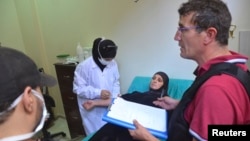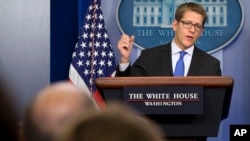The U.S. is consulting with various foreign leaders as it weighs whether to carry out a military strike against Syria for its suspected chemical weapons attack last week.
The White House said that in recent days President Barack Obama has talked with British Prime Minister David Cameron, French President Francois Hollande, Canadian Prime Minister Stephen Harper and Australian Prime Minister Kevin Rudd, as he seeks to assess a possible attack and a coalition that might support it.
Western leaders have widely criticized Syrian President Bashar al-Assad for the alleged chemical weapons attack August 21, which rebels say killed hundreds of people. White House spokesman Jay Carney on Tuesday said Britain agrees with the United States about the "appalling nature" of the chemical attack.
"We are in direct contact with Prime Minister Cameron and his government, and the president himself has spoken with the prime minister, as he has with other foreign leaders, and those consultations will continue. And we share the views of the British government about the appalling nature of the transgression that occurred in Syria, and are consulting with the British and other allies and partners about the appropriate response," said Carney.
He said Obama has not made a decision on a possible attack.
The White House said Vice President Joe Biden; Secretary of State John Kerry; Defense Secretary Chuck Hagel; General Martin Dempsey, chairman of the Joints Chiefs of Staff, and United Nations Ambassador Samantha Power all have been consulting with their counterparts in a wide range of countries to discuss the Syrian attack and how to respond to it.
Among other contacts, the U.S. has talked with officials in Russia, China, Israel, Italy, Egypt, Turkey, Saudi Arabia, Germany, Togo, Rwanda, South Korea, Argentina and South Africa, as well as leaders at the UN, NATO and the Arab League.
The White House said that in recent days President Barack Obama has talked with British Prime Minister David Cameron, French President Francois Hollande, Canadian Prime Minister Stephen Harper and Australian Prime Minister Kevin Rudd, as he seeks to assess a possible attack and a coalition that might support it.
Western leaders have widely criticized Syrian President Bashar al-Assad for the alleged chemical weapons attack August 21, which rebels say killed hundreds of people. White House spokesman Jay Carney on Tuesday said Britain agrees with the United States about the "appalling nature" of the chemical attack.
"We are in direct contact with Prime Minister Cameron and his government, and the president himself has spoken with the prime minister, as he has with other foreign leaders, and those consultations will continue. And we share the views of the British government about the appalling nature of the transgression that occurred in Syria, and are consulting with the British and other allies and partners about the appropriate response," said Carney.
He said Obama has not made a decision on a possible attack.
The White House said Vice President Joe Biden; Secretary of State John Kerry; Defense Secretary Chuck Hagel; General Martin Dempsey, chairman of the Joints Chiefs of Staff, and United Nations Ambassador Samantha Power all have been consulting with their counterparts in a wide range of countries to discuss the Syrian attack and how to respond to it.
Among other contacts, the U.S. has talked with officials in Russia, China, Israel, Italy, Egypt, Turkey, Saudi Arabia, Germany, Togo, Rwanda, South Korea, Argentina and South Africa, as well as leaders at the UN, NATO and the Arab League.






